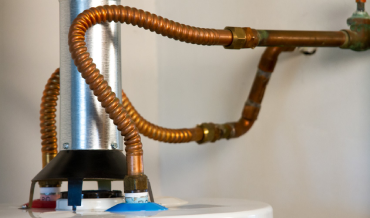
Mr. Rooter Plumbing explains how to check your water heater for corrosion to prevent costly damage.
|
Although water heaters are designed to keep corrosion at bay, the combination of metal, water, and oxygen is the perfect mixture to start the chemical reaction that leads to corrosion. Water that contains contaminants or minerals will make the problem worse.
If your water heater begins to show signs of corrosion, it’s likely time for a replacement. Learn how to spot signs of water heater corrosion and what to do if you suspect corrosion may be taking place within your water heater.
Water Heater Corrosion: What to Look For
To determine if you have water heater corrosion, look for these three primary warning signs:
- Rust-colored water: If your hot water is coming out with a rusty hue, you may have corrosion in your hot water heater. Rust can develop in water heaters as young as eight years old.
- Rusty valves: If there is rust on the water inlet valve or pressure relief valve on your water heater, it’s likely that rust is also inside the tank. It’s time for a replacement water heater!
- Water tank leaks: If the water tank itself appears to be leaking water, it’s time to contact a plumber; for a professional inspection. It can be difficult to tell whether the leak is coming from the tank’s seams or the drain valve, so don’t give up until you have a professional diagnosis.
Possible causes of water heater corrosion include mineral and sediment buildup, as well as the age of your water heater.
Corrosion on Water Heater Connections
If the seams between the hot water tank and its connecting pipes appear to be rusty or corroded, the water heater may be in danger of catastrophic failure. If there is rust anywhere on your water heater tank, that is a sign that it’s time for a new water heater. If left untreated, the corrosion will lead to leaking or flooding.
If you notice corrosion at the connection between steel and copper pipes on your water heater, however, that may be a sign of galvanic corrosion (electrochemical). Water pipe replacement may be necessary, but your water heater should be fine and able to continue to function after this replacement. The first step to resolving the problem is to obtain a licensed plumber’s opinion.
How to Prevent Water Heater Corrosion
Following a basic water heater care plan can help prevent corrosion from shortening your water heater’s lifespan.
- Have galvanized pipe joints replaced with plastic-lined nipples (dielectric nipples) to prevent galvanic corrosion between steel and copper connections?
- Inspect the anode rod yearly and replace it whenever necessary.
- Drain the hot water tank; yearly to flush out sediment.
Choose Mr. Rooter for Water Heater Replacement Service
Do you see signs of water heater corrosion? No problem! Your local Mr. Rooter; water heater experts; are equipped to address any and all water heater concerns. Give us a call or complete our; estimate request form, and we’ll be in touch soon.

